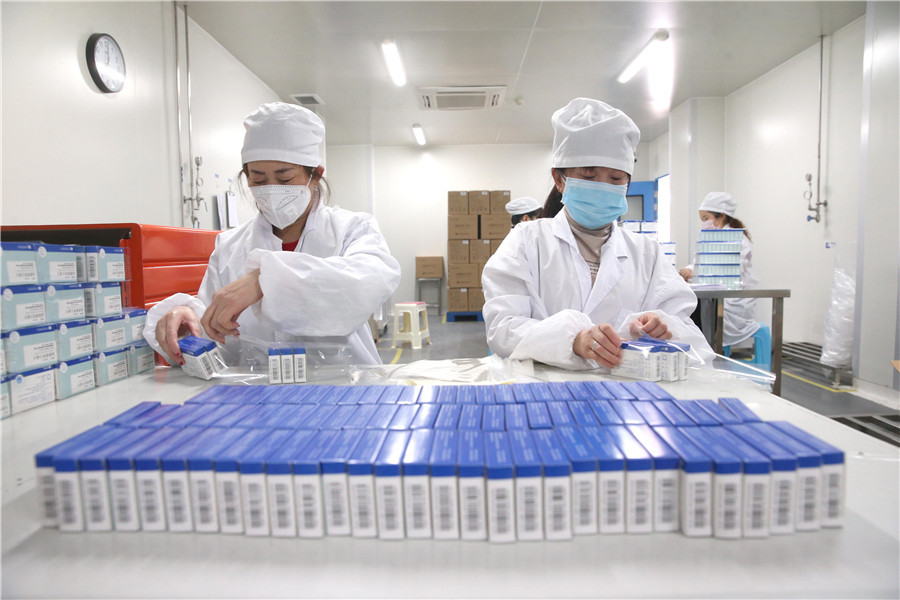
Employees pack medicines at a production facility in Meishan, Sichuan province, on Feb 10. (Photo: China Daily)
A clinical trial in China of the experimental drug remdesivir on severe coronavirus patients has been canceled because of a lack of participants, but another trial of the drug on mildly and moderately ill patients continues and the results are scheduled for release on April 27, a chief scientist said.
Remdesivir was created by Gilead Sciences, a biotech company in the United States.
Initially, 453 severely ill coronavirus patients were to take part in the clinical trial, but media reported last month that enrollment fell short of the requirement because of a decrease in the number of eligible patients for the trial's rigorous standards.
"Gilead has been informed that the study in China in patients with severe disease was terminated early due to low enrollment," the company said in a statement on Friday. "The study in China on patients with mild to moderate disease is ongoing."
That trial is a randomized, double-blind, placebo-controlled study on 270 patients in Wuhan, Hubei province, its chief scientist, Cao Bin, wrote in an article on the drug's latest developments. The results are expected on April 27, making it the first piece of solid clinical evidence of the drug's suitability for treating COVID-19.
"We have upheld extremely strict enrollment criteria with a very tight treatment window, because we realize that only by testing on these patients diagnosed early on can we ensure the efficacy of the trial," Cao said in a public seminar on March 31.
In Cao's experiment, the treatment window for enrolling severe patients is less than 12 days from their first showing symptoms, and less than 8 days for mild and moderate patients. This means the patients must not have received other treatments and were quickly enrolled.
The clinical trials of remdesivir conducted by the World Health Organization and the United States National Institutes of Health do not have the same treatment window requirement.
On Friday, the New England Journal of Medicine published a study on 53 patients from the United States, Canada, Europe and Japan who were treated with remdesivir through compassionate use. Many of them were on life supporting ventilators.
Overall, 36 of the 53 patients showed clinical improvement. The authors and other scientists have argued that this data must be taken with a grain of salt because the experiment had a small sample size and was not a meticulously designed scientific study.
The study said 17 of the 30 patients on ventilators no longer needed the device after the treatment. The authors said the death rate of patients in the study was about 13 percent, which is lower than the 17 to 78 percent death rate range for similarly ill patients in China.
However, 32 patients reported various degrees of side effects. Mild ones included skin rash, diarrhea, renal impairment and low blood pressure. Serious side effects consisted of multi-organ dysfunction syndrome, septic shock and acute kidney injury.
Cao said in his commentary that the 13 percent death rate is questionable due to insufficient data. He also said the paper was ambiguous when stressing 68 percent of the patients on ventilators no longer needed the device but not much data was presented to support that their clinical symptoms had improved.
Lan Ke, the director of the State Key Laboratory of Virology at Wuhan University, said in a review that the data from the latest study requires closer scrutiny, and scientists should pay more attention to the side effects.
Some of the more serious side effects prove that "this drug must be used under necessary medical supervisions and conditions," he said, adding that researchers should exercise "cautious optimism" when probing and discussing the drug's efficacy.


